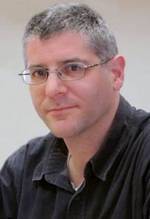Matthew Morgenstern
Matthew Morgenstern | |
|---|---|
 | |
| Born | 1968 |
| Citizenship | Israeli and British |
| Occupation | Professor |
| Academic background | |
| Alma mater | Hebrew University of Jerusalem (Ph.D., 2002) |
| Thesis | The Aramaic Language in the Responsa of the Babylonian Geonim (2002) |
| Academic work | |
| Institutions | Tel Aviv University |
| Main interests | |
Matthew Morgenstern, also known as Moshe Morgenstern (Template:Lang-he; born 1968 in London, United Kingdom), is an Israeli linguist and religious studies scholar known for his work on Eastern Aramaic languages, especially Mandaic. He is currently Full Professor in the Department of Hebrew Language and Semitic Linguistics at Tel Aviv University.[1][2]
Education
Matthew Morgenstern was born in London in 1968. He obtained his B.A. degree in Social and Political Science from the University of Cambridge in 1990. In 1992, he received his Master of Arts degree in Aramaic Bible Translation from the Department of Hebrew and Jewish Studies at University College London. In the same year, he immigrated to Israel.
In Israel, he studied at the Hebrew University of Jerusalem, where he first obtained a Master of Arts degree in Hebrew Language in 1996. As a masters student, he was part of a research group that worked on the Dead Sea Scrolls.[3] Morgenstern continued his doctoral studies at the Hebrew University of Jerusalem, where he received his doctorate (summa cum laude) in 2002 and completed a thesis titled The Aramaic Language in the Responsa of the Babylonian Geonim.[4]
Career
From 2002 to 2013, he performed research and taught at the University of Haifa. From 2011 to 2012, he spent a sabbatical as a visiting professor at the Free University of Berlin. Today, he is employed as a full professor in the Department of Hebrew Culture at Tel Aviv University.[5]
Research
Matthew Morgenstern is engaged in various fields of Semitic studies, especially Aramaic studies. His main focus is on Eastern Aramaic dialects, especially Jewish Babylonian Aramaic and Classical Mandaic. He is involved in the study of Mandaean manuscripts,[6] as well as the photography, digitization, transcription, and translation of incantation bowls and amulets.[7]
Morgenstern is currently working on a new dictionary of Mandaic.[8]
Organizations
In 2013, Matthew Morgenstern co-founded the Society for Mandaean Studies, of which he is an elected board member.[9]
Books
- Morgenstern, Matthew (2011). Studies in Jewish Babylonian Aramaic: based upon early Eastern manuscripts. Winona Lake, Ind: Eisenbrauns. ISBN 978-1-57506-938-8. OCLC 673419642.
- Ford, James Nathan; Morgenstern, Matthew (2020). Aramaic Incantation Bowls in Museum Collections. Brill. doi:10.1163/9789004411838. ISBN 978-90-04-41183-8. S2CID 203191491.
References
- ^ Borschel-Dan, Amanda (2018-02-01). "Scientists claim to crack an elusive centuries-old code - and it's Hebrew". The Times of Israel. Retrieved 2021-11-08.
- ^ Dury, Julien (2019-09-09). "Russia exhibit to showcase medieval Jewish life in Afghanistan". The Times of Israel. Retrieved 2021-11-08.
- ^ Borschel-Dan, Amanda (2018-07-05). "Dead Sea Scrolls decoder remembered as grande dame of Semitic paleography". The Times of Israel. Retrieved 2021-11-08.
- ^ "Prof. Matthew Morgenstern". Tel Aviv University. 1980-01-01. Retrieved 2021-11-08.
- ^ "פרופ' משה מורגנשטרן". אוניברסיטת ת"א (in Hebrew). 1980-01-01. Retrieved 2021-11-08.
- ^ "Mythicism, Monotheism, and Mandaeism". Religion Prof. 2020-09-15. Retrieved 2021-11-08.
- ^ Academia.edu
- ^ Morgenstern, Matthew (2009). "The Present State of Mandaic Lexicography I: The Mandaic Dictionary". Aramaic Studies. 7 (2). Brill: 113–130. doi:10.1163/147783509x12627760049633. ISSN 1477-8351.
- ^ Society for Mandaean Studies.
External links
- 1968 births
- Living people
- Academic staff of Tel Aviv University
- Religious studies scholars
- Scholars of Mandaeism
- Israeli historians of religion
- Hebrew University of Jerusalem alumni
- Semiticists
- Linguists from Israel
- British emigrants to Israel
- Israeli lexicographers
- Translators from Aramaic
- Translators from Mandaic
